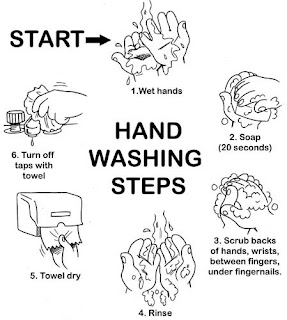 Hand washing is a simple habit that can help keep you healthy. Learn the benefits of good hand hygiene, when to wash your hands and how to clean them properly.
Hand washing is a simple habit that can help keep you healthy. Learn the benefits of good hand hygiene, when to wash your hands and how to clean them properly.Hand washing is a simple habit, something most people do without thinking. Yet hand washing, when done properly, is one of the best ways to avoid getting sick.
This simple habit requires only soap and warm water or an alcohol-based hand sanitizer — a cleanser that doesn't require water. Do you know the benefits of good hand hygiene and when and how to wash your hands properly?
The dangers of not washing your hands :-
Despite the proven health benefits of hand washing, many people don't practice this habit as often as they should — even after using the toilet. Throughout the day you accumulate germs on your hands from a variety of sources, such as direct contact with people, contaminated surfaces, foods, even animals and animal waste. If you don't wash your hands frequently enough, you can infect yourself with these germs by touching your eyes, nose or mouth. And you can spread these germs to others by touching them or by touching surfaces that they also touch, such as doorknobs.
Infectious diseases that are commonly spread through hand-to-hand contact include the common cold, flu and several gastrointestinal disorders, such as infectious diarrhea. While most people will get over a cold, the flu can be much more serious. Some people with the flu, particularly older adults and people with chronic medical problems, can develop pneumonia.
Inadequate hand hygiene also contributes to food-related illnesses, such as salmonella and E. coli infection.
Proper hand-washing techniques :-
Good hand-washing techniques include washing your hands with soap and water or using an alcohol-based hand sanitizer. Antimicrobial wipes or towelettes are just as effective as soap and water in cleaning your hands but aren't as good as alcohol-based sanitizers.
Antibacterial soaps have become increasingly popular in recent years.However, these soaps are no more effective at killing germs than is regular soap. Using antibacterial soaps may lead to the development of bacteria that are resistant to the products' antimicrobial agents — making it even harder to kill these germs in the future. In general, regular soap is fine. The combination of scrubbing your hands with soap — antibacterial or not — and rinsing them with water loosens and removes bacteria from your hands.
Proper hand washing with soap and water.
Follow these instructions for washing with soap and water :-
(1) Wet your hands with warm, running water and apply liquid soap or use clean bar soap. Lather well.
(2) Rub your hands vigorously together for at least 15 to 20 seconds.
(3) Scrub all surfaces, including the backs of your hands, wrists, between your fingers and under your fingernails.
(4) Rinse well.
(5) Dry your hands with a clean or disposable towel.
(6) Use a towel to turn off the faucet.
Proper use of an alcohol-based hand sanitizer :-
Alcohol-based hand sanitizers — which don't require water — are an excellent alternative to hand washing, particularly when soap and water aren't available. They're actually more effective than soap and water in killing bacteria and viruses that cause disease. Commercially prepared hand sanitizers contain ingredients that help prevent skin dryness. Using these products can result in less skin dryness and irritation than hand washing.
Not all hand sanitizers are created equal, though. Some "waterless" hand sanitizers don't contain alcohol. Use only the alcohol-based products. The CDC recommends choosing products that contain at least 60 percent alcohol.
To use an alcohol-based hand sanitizer:-
(1) Apply about 1/2 teaspoon of the product to the palm of your hand.
(2) Rub your hands together, covering all surfaces of your hands, until they're dry.
If your hands are visibly dirty, however, wash with soap and water, if available, rather than a sanitizer.
When should you wash your hands?
Although it's impossible to keep your bare hands germ-free, there are times when it's critical to wash your hands to limit the transfer of bacteria, viruses and other microbes.
Always wash your hands:-
(1) After using the toilet
(2) After changing a diaper — wash the diaper-wearer's hands, too
(3) After touching animals or animal waste
(4) Before and after preparing food, especially before and immediately after handling raw meat, poultry or fish
(5) Before eating
(6) After blowing your nose
(7) After coughing or sneezing into your hands
(8) Before and after treating wounds or cuts
(9) Before and after touching a sick or injured person
(10) After handling garbage
(11) Before inserting or removing contact lenses
(12) When using public restrooms, such as those in airports, train stations, bus stations and restaurants.
Hand washing doesn't take much time or effort, but it offers great rewards in terms of preventing illness. Adopting this simple habit can play a major role in protecting your health.
No comments:
Post a Comment